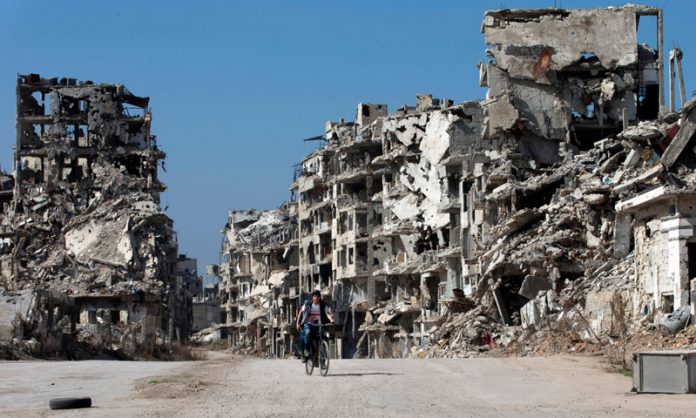Turkey’s launch of Operation Olive Branch on Jan. 20, forces the United States to revise its Syria policy. Sooner or later, the Americans will have to reconsider their People’s Protection Units (YPG) policy as well.
Washington made a huge mistake by relating its plans to remain in Syria after Daesh is defeated. But their biggest mistake was to turn their back on the Free Syrian Army (FSA), which represents Syrian Arabs and Sunnis, instead of empowering it. The “tactical” minds in Washington were wrong to assume that the YPG was the only group on the ground that they could cooperate with.
Provided that Washington’s Syria policy continues to be shaped by officials appointed by the Obama administration, it came as no surprise when Gen. Joseph Votel, the commander of U.S. Central Command (CENTCOM), announced that the U.S. did not intend to leave Manbij. Washington’s negative response to repeated requests by the Turks to withdraw their troops from Manbij suggests that bilateral relations will remain strained in the foreseeable future. It would appear that Washington will monitor Turkey’s operational performance from the sidelines and look for ways to undermine the campaign.
On the contrary, U.S. policymakers must reconsider their YPG-centered Syria policy now that Turkey’s fight against the PKK/YPG reached a new level – to be able to remain in Syria and to adapt to the shifting balance of power in the Middle East.
I argue that there are two options available for the U.S. First, Washington could bank on the assumption that Turkey’s military campaign will fail and refrain from making any deals with the Turks. By protecting YPG militants in Manbij and east of the Euphrates River, the U.S. could seek to wear down Turkey. Needless to say, that decision would deprive Washington of scoring points on the ground and on the negotiating table. Moreover, such a decision could encourage new advances by Russia, Iran and the Syrian regime. Meanwhile, perhaps the decision-makers in Washington are the only people in the world who can’t appreciate the ineffectiveness of plans to contain Iran with YPG forces – or Turkey’s determination to fight the PKK/Democratic Union Party (PYD), for that matter?
Washington’s second option is to promote some kind of rapprochement with Turkey by forcing YPG militants to withdraw from certain areas, including Manbij. Although the two countries disagree on a range of issues, which resulted in a loss of confidence, the spirit of historical cooperation could facilitate a speedy recovery. Moving forward, Ankara and Washington could put a pin on their disagreements to work together.
CENTCOM’s short-sighted Syria and YPG policies could be reformed and the train-and-equip program for the Free Syrian Army could be resumed. Meanwhile, Turkey and the U.S. could support Syrian Kurdish groups, with the exception of the YPG, and facilitate the return of refugees by rebuilding areas under the control of the Free Syrian Army, which could be transformed into a national army. It is safe to assume that such developments could contribute to the Geneva process and counter-balance the Assad regime.
Otherwise, efforts by Turkey and the United States to wear each other down will ultimately serve the interests of Russia, Iran and the Assad regime. For example, it is clear that Turkey’s open fight against the YPG forces will render Washington’s efforts to incorporate Sunni tribes into the group futile. Provided that the YPG militants have engaged in ethnic cleansing and ruled with an iron fist, it is unlikely for the organization to create a permanent administration in cooperation with Sunni Arabs.
It is telling that 130,000 refugees have returned to the Euphrates Shield area, whereas there have been no returns to YPG-controlled parts of northern Syria. Turkey’s argument that Operation Olive Branch was launched to secure the safe return of refugees to Syria is quite popular at home and in Europe. The fact that Berlin started considering the PKK a threat to its domestic security was an important sign of change. Moreover, smear campaigns against the Free Syrian Army are unlikely to generate negative publicity akin to Daesh.
The Sochi and Geneva processes will be difficult for all parties. By inviting non-YPG Kurdish groups to Sochi, Russia created a new win-win situation in Turkey-U.S. relations – second only to Operation Olive Branch.
Efforts by the U.S to include the YPG militants in the Geneva process would fuel additional tensions between Ankara and Washington. But the White House could start turning things around by ending CENTCOM’s hegemony on Syria and YPG policies.
Courtesy: This article was first appear on Daily Sabah.





